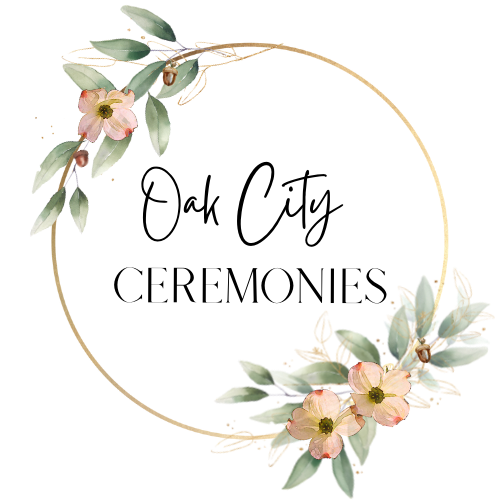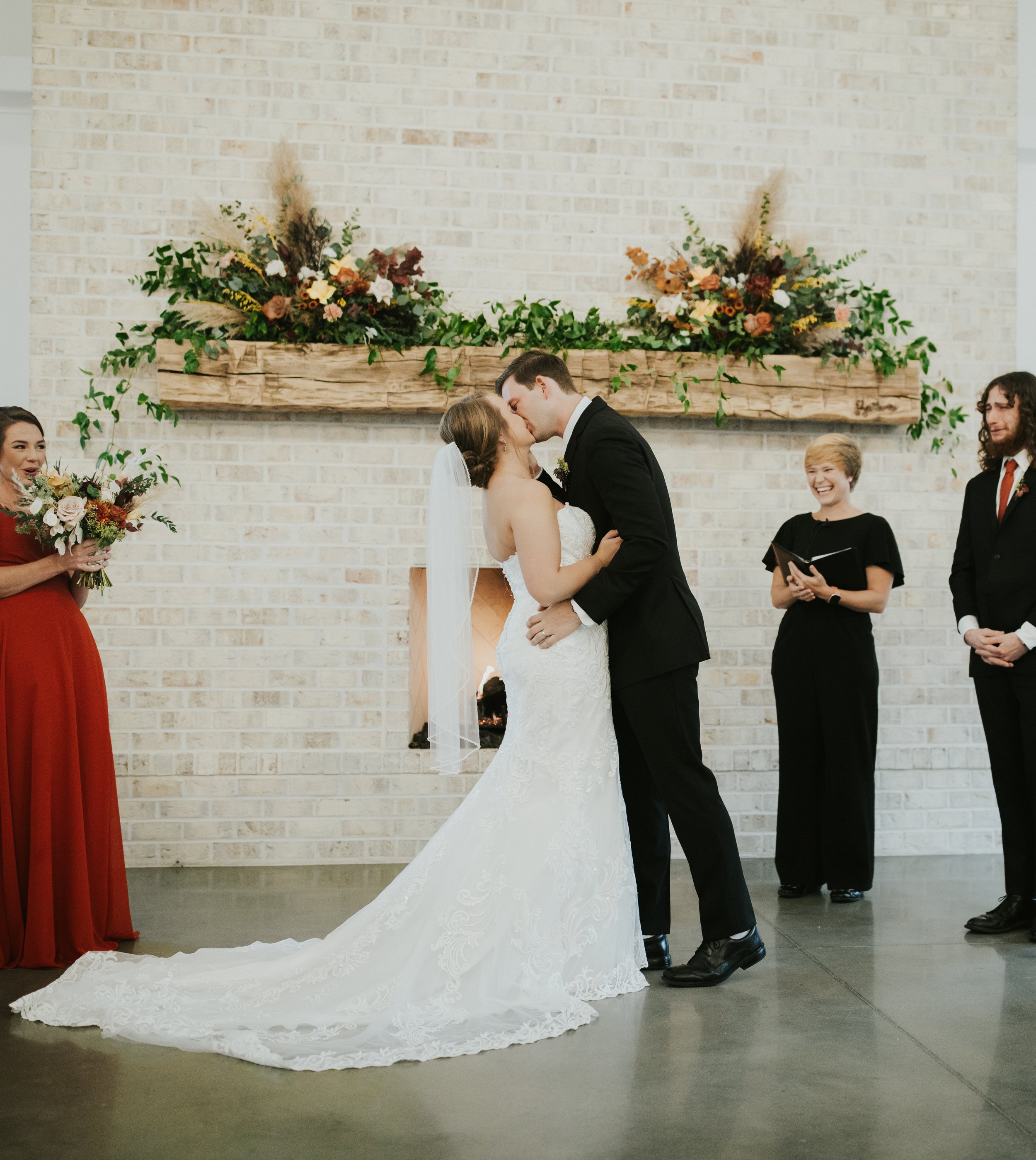Updating Outdated Wedding Traditions
Part of what makes a wedding ceremony beautiful and meaningful is tradition. Everything from the custom of the bride wearing white to the wedding processional to exchanging wedding rings is a form of tradition, and those traditions are often tied in symbolism that can make those things really special. But what do we do with traditions that either don’t feel right for a modern wedding, or just don’t sit well with us personally? The good news is: it’s your wedding and you get to do what you want! While traditions are part of what makes a wedding a wedding, you get to pick and choose what you want to include in your wedding. If there’s something you want to throw out the window we say go for it!
Oftentimes, however, we want to have the best of both worlds— we want to pay homage to tradition, but we want to do it in a way that doesn’t feel, well, cringey in some cases. Here are some common outdated wedding traditions with some ways that you can update them for a more modern and authentic feel.
Photo Credit: Long Yau Photography
1. The Walk Down the Aisle
Traditionally, the bride’s father walks her down the aisle to meet her soon-to-be husband. For most of our brides this is something really special that they want to do, but sometimes things are just complicated. Strained relationships, death, or just a desire to share that special moment equally with other parents can make alternatives appealing. Same-sex couples have to get at least a little creative here by default!
With every ceremony we create, we meet first with the couple and go over all the details of their wedding ceremony with them, and this is one of the things we discuss— how are you going to get down the aisle? Often the answer is simply, “My dad will walk me down the aisle”, and that’s great! We’ve also seen brides come down the aisle escorted by both parents, a brother, an uncle, a son, or even a close friend. We’ve had brides Megan Markle it and walk themselves down the aisle, grooms whose moms have walked them down, and couples who have walked out together. Sometimes we have to brainstorm and throw some options around before we come up with the thing that feels right, but we love helping you figure out what that is! The only thing we usually suggest you not do is pick the most appropriate male you can think of at random because you feel obligated to make it traditional: walking down the aisle is symbolic of the love and support of those who have been with you the longest, however you want to show that, but it should feel special and personal.
Photo Credit: Him & Her Photo
2. “Who Gives This Woman to be Married?”
This is one of the traditions that most modern couples have zero interest in— it hearkens back to times when women legally belonged to men, and was used to verify that the bride’s father was literally willing to give her away (usually in exchange for a dowry). While there are some couples that like the traditional wording and aren’t bothered by former meanings, most are ready to ditch this one! In that case we usually do one of two things: update the wording, or leave it out entirely.
To update the wording, we like to address people by name instead of asking the question to the universe at random. We also discard the word “give” in favor of something like “support”, and we are more inclusive in who we’re talking to and about. We end up with something like this:
“John, do you come here in support of Emily’s marriage to Steven today?”
or “John and Carol, Jeff and Amy, do you come in support of Emily and Steven’s marriage today?”
This can be customized endlessly— we can address the whole extended family, just the parents of the bride, or whatever feels authentic to you and your loved ones.
If you’d rather leave the question out entirely then we do the whole thing to music: the bride walks down the aisle, stops with her escort (if she has one) at the front row, the groom steps forward, hugs, kisses, and/or handshakes are exchanged, and then the bride and groom walk the rest of the way to the officiant. It works great either way; it’s purely a matter of preference!
3. Vow Wording
Another thing we talk about in our planning meeting is the type of vows you’re going to use. When we get to this point we’ll sometimes have a bride ask, “If we choose not to write our own vows, do I have to promise to honor and obey?” The answer is a a big NO. Once you’ve chosen your vow style we send you a bunch of different vows to choose from (unless you’re writing your own), and not a single one has the word “obey” in it! And if you don’t love one of the ones we send, you can find something else you like, mix and match words from our vows, or even add or subtract lines as you please. Legally your vows have to make it clear that y’all really want to get married— how you say that is totally up to you!
4. The Kiss & Pronouncement
“I now pronounce you husband and wife! You may kiss your bride!”
It’s the absolute peak of the ceremony and it gets us every time, even though we say it most weekends! While the majority of our couples still prefer the traditional wording, we are here for it if you’d like to do something a little different. With same-sex couples we’re obviously going to pronounce you as something other than husband and wife, whether that’s simply “married” or “a married couple”, or “partners in life and love, body and mind, heart and soul” or another more creative wording. And if you’d rather be given permission to kiss your groom or kiss each other, let’s make it happen! One of our favorites that we’ve used is, “Y’all may kiss”!
Photo Credit: Sarah C. Stewart Photography
5. The Presentation of the Couple
Another big moment! Your officiant asks everyone to stand with her, puts on her best boxing ring announcer voice, and says, “it’s my distinct honor to present to you for the very first time: Mr. and Mrs. Steven and Emily Baldwin!” The crowd goes wild, the amazing recessional song you picked out drops, and you and your brand-new spouse walk back down that aisle on cloud nine!
Traditionally you would be announced as “Mr. and Mrs. [groom’s first name] and [bride’s first name] [new last name]”, although plenty of people opt to keep it as “Mr. and Mrs. [new last name]”. This is a little more complicated for people who aren’t taking a common last name, though. When that’s the case, we can announce you as “The Newlyweds, Emily and Steven!” or “Emily and Steven as husband and wife!” or something along those lines. I’ve also had couples opt to be announced by a common last name even though they aren’t actually planning on legally changing their names, just because they like the sound of it.
However you choose to put your wedding ceremony together, the most important thing is that you do what feels authentic to you and will give you awesome memories to look back on. If your officiant hasn’t discussed these things with you, make sure you bring it up with them so you can ensure that you’re comfortable with everything that’s going to be said during your wedding ceremony. After all, it’s your wedding and you deserve something amazing!
Photo Credit: Veritas Digital Photography




